 |
 |
 |
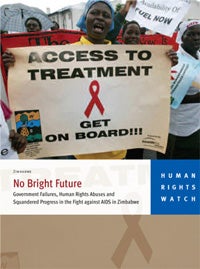 |
"No Bright Future: Government Failures, Human Rights Abuses and Squandered Progress in the Fight against AIDS in Zimbabwe" Zimbabwe: July 2006 Human rights violations and inadequate health and social welfare policies are undermining progress in the fight against AIDS in Zimbabwe. Three thousand people die each week due to governmental policies that create formidable obstacles to accessing life-saving treatment. The prohibitively high costs of antiretroviral treatment and the government’s failure to inform HIV-positive individuals about the eligibility criteria for antiretroviral therapy have resulted in violations of people’s right to health. Women are among the most affected in Zimbabwe as they are often forced to engage in high-risk behaviors in order to survive and support their families, and are less able to independently find funds for treatment. After the government’s program of evictions in 2005, hundreds of people continue to live in appalling conditions, increasing the risk of HIV infection for thousands and further endangering the lives of those already infected. Zimbabwe, often hailed as a success story for a recent drop in HIV prevalence rates, continues to face an HIV/AIDS crisis that is driven by the government’s reluctance to implement equitable and non-discriminatory economic and social policies. “There’s no bright future because when you don’t know what you are going to eat tomorrow, there’s no future.” |
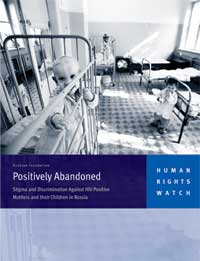 |
Russia: June 2005 Though Russia is home to one of the fastest-growing AIDS epidemics in the world, the Russian public is almost as unaware of HIV today as it was a decade ago, when the disease was scarcely heard of. Little action on the part of the government has resulted in a social shame so significant that those infected will go to extremes to hide it from friends, family or coworkers—often resulting in isolation. It is against this backdrop that a growing number of HIV-positive pregnant women have begun abandoning their babies. Shunned by society, vulnerable to discrimination and wary of the costs of raising a child, these women are leaving their children to be placed in specialized orphanages for HIV-positive children, or worse, warehoused in stark hospital wards. The quarantine of these children is illegal and discriminatory, but has become accepted in a society where fear and ignorance have created a vast social stigma. There are national and international standards that are supposed to protect the children of HIV-positive women, but the Russian government is failing to implement them. “They told us not to kiss our child and to keep a separate set of dishes.” |
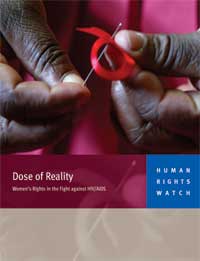 |
“A Dose of Reality: Women’s Rights in the Fight against HIV/AIDS” Global: March 2005 |
 |
“A Test of Inequality: Discrimination against Women Living with HIV in the Dominican Republic” Dominican Republic: July 2004 The growing HIV/AIDS epidemic in the Dominican Republic is unfolding in the context of entrenched inequality between men and women and significant levels of high-risk behavior. This situation has put women at increased risk of HIV infection and allowed for human rights violations against women in the workplace and healthcare system. It has not been uncommon for employers in the Dominican Republic to administer illegal HIV tests to workers and jobseekers with impunity, in particular within the tourism and free trade industries – the two main sectors of female employment. If women seek health care related to their status, they have often been provided with grossly insufficient pre- and post-test counseling, have had their confidentiality rights violated or have been delayed or denied medical procedures altogether. While the government of the Dominican Republic has taken important steps to address HIV/AIDS in the country, it has failed to recognize this link between the spread of the disease and the entrenched sex inequality, violence and social biases that otherwise limit women’s autonomy and rights. If government leaders hope to curb this epidemic, they must recognize this link and establish policies to address the damage it produces. “They take your blood.... Then they send the results to the boss.... Then the boss tells you there is no work.” |
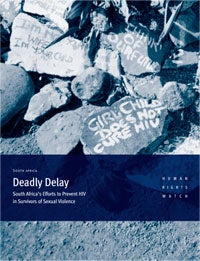 |
“Deadly Delay: South Africa's Efforts to Prevent HIV in Survivors of Sexual Violence” South Africa: March 2004 Sexual violence against women and girls in South Africa has been a problem of epidemic proportions. In a nation with the highest reported rate of HIV/AIDS in the world, this violence could be a death sentence. In 2002, the South African government took the important step of pledging to provide rape survivors with the short, affordable course of antiretroviral drugs known as post-exposure prophylaxis (PEP). If administered promptly, PEP can reduce the risk of HIV transmission. In a 2004 investigation, Human Rights Watch found that while this effort was a crucial step toward protecting women from the consequences of sexual violence, the government’s failure to provide adequate information or training about PEP left rape survivors and service providers without basic information about PEP. PEP was generally unavailable outside major urban centers. By law, children under 14 could not consent to medical treatment; while provisions existed to obtain proxy consent in cases where no parent or guardian could be reached, many health care staff did not know or did not follow them. Inadequate police response to rape complaints, coupled with health professionals’ insistence that rape survivors file a police report in order to receive services, also undermined survivors’ access to services. In pledging to provide PEP, South Africa took an important stride in protecting rape survivors from HIV/AIDS. But without measures to ensure its availability, these commitments have been compromised. “The hospital superintendent was scared to give the antiretrovirals because he thought it was against government policy. He got a protocol, but he had no drive from the government to help staff the program. I had to convince the hospital superintendent to start providing PEP [post-exposure prophylaxis].” |
 |
Africa: December 2003 |
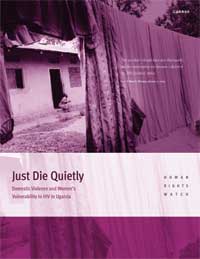 |
“Just Die Quietly: Domestic Violence and Women’s Vulnerability to HIV in Uganda” August 2003 For many women in Uganda, domestic violence and unwanted sexual relations are not isolated or aberrant acts, but part of the context of their daily lives. Many Ugandan women have been involved in polygamous unions and a number have been coerced into unprotected sex, exacerbating the risk of contracting HIV in a region with already-high infection rates. Ugandan women who confront such abuse contend with widespread social tolerance of such practices, coercion and emotional abuse by their husbands and extended family, as well as – in some cases – marital rape. In this environment, fear has stopped women from accessing information about HIV/AIDS, from being tested for infection, or from receiving treatment and counseling. Women often attend HIV/AIDS clinics in secret, and are afraid to discuss HIV/AIDS with their husbands—even if they suspect the men are the source of their own infection. Those who are widowed by AIDS have faced eviction from their homes, and in some cases have confronted the traditional practice of widow inheritance. The Ugandan government has failed to criminalize, condemn or prosecute the deadly abuse against women, and if it hopes to curb an already disastrous epidemic, it must take immediate action. “Even when he was HIV-positive he still wanted sex. He refused to use a condom. He said he cannot eat sweets with the paper [wrapper] on.” |
 |
“Double Standards: Women’s Property Rights Violations in Kenya” Kenya: March 2003 In Kenya, women from various regions, ethnic groups, religions and social classes have one thing in common: because they are women, their property rights have been trampled. Women are excluded from land inheritance, evicted from their property by in-laws, stripped of their possessions and forced to engage in risky sexual practices in order to keep their homes. If they try to fight back, they may be beaten, raped or ostracized from their communities. These rights violations have the intent and consequence of perpetuating women’s dependence on men for property rights and undercutting their social and economic status. In addition, these practices have perpetuated risky sexual behavior, fueling the risk of HIV/AIDS. If the government of Kenya, which has ignored this problem for decades, does not act to eliminate this insidious form of discrimination, Kenya will see its fight against HIV/AIDS stagger and fail. “I don't use condoms with the women. It must be body to body. I must put sperm in her.... If no sperm comes out, she is not inherited....” |
 |
“We’ll Kill You If You Cry: Sexual Violence in the Sierra Leone Conflict” Sierra Leone: January 2003 Throughout the 1991 to 2001 armed conflict in Sierra Leone, thousands of women and girls were systematically subjected to brutal sexual violence initiated predominantly by rebel forces, including individual and gang rape and rape with objects such as weapons, firewood, umbrellas and pestles. Many of the younger victims of such atrocities did not survive: some bled to death or suffered severe infections. Those who did survive were often abducted, subjected to sexual slavery by members of rebel forces, and put at risk of HIV infection. Though the war was declared over in 2002, an unknown number of these women and girls remained sexual slaves as of 2003, when Human Rights Watch published this report. There was no accountability for the thousands of sex crimes that were committed during the war, and few assistance programs existed to provide support to survivors. Victims not only lived with the severe physical and mental health consequences of the abuses suffered, but they also feared non-conflict-related sexual violence, largely perpetrated with impunity. Human Rights Watch called on international donors and nongovernmental organizations to work together with the government of Sierra Leone to establish programs to rehabilitate the survivors of sexual violence. “Then he said, ‘Well, tonight you are going to have sex, because you are going to be killed and you should do it before you die.’”– A.J., 14 year-old student, Pujehun, February 12, 2002 |
 |
“The War Within the War: Sexual Violence Against Women and Girls in Eastern Congo” June 2002 In violence-riddled Congo, rape was a weapon of war. Women and girls were continually and systematically sexually assaulted by members of the many warring militias, many of whom were infected with HIV/AIDS. And because war has ravaged this region intermittently since 1996, women were forced to flee their homes, seeking shelter in unfamiliar towns where they were increasingly subject to abuse by soldiers, police or government officials. A climate of impunity has prevented rape cases from being taken seriously, furthering a culture of violence that ostracizes rape survivors from their community and families. Unless this culture is addressed, women will continue to suffer sexual violence, and more will die. “Women are victims of the war. We don't take up arms but we, the women, suffer the most.” |
